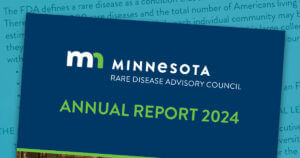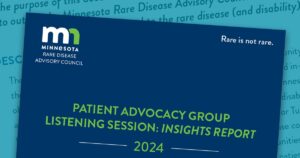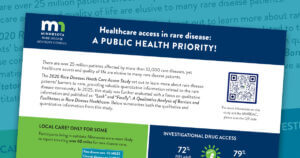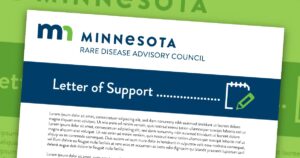Resources
The Minnesota Rare Disease Advisory Council (MNRDAC) provides educational resources and support tools for the rare disease community, policymakers, and providers to address barriers to care. We are continually gathering resources relating to diagnosis, access to treatment, services, and education. If you have a rare disease resource suggestion, please contact us: [email protected].
Actual patient photos used with permission from Brave Souls Photography

MNRDAC Reports
2024 Annual Report
In 2024, MNRDAC worked to pass bills, improve policies, increase representation in state agencies, and build collaborations with community partners….

2024 Patient Advocacy Group Listening Session: Insights Report
The purpose of this document is to summarize the 2024 Community Legislative Debrief and to outline the Minnesota Rare Disease…

Rare Disease Patient Survey-Qualitative and Quantitative Summary
The 2020 Rare Diseases Heath Care Access Study set out to learn more about rare disease patients’ barriers to care,…
Public Comment and Letters of Support

Letter of Support
Providing Realistic Opportunity to Equal and Comparable Treatment (“PROTECT Rare”) Act
The bill will build on existing criteria for medically necessary care so that Medicare and Medicaid will be able to consider clinical guidelines and peer-reviewed literature to assess coverage of rare disease treatments. Importantly, the bill does not provide ‘special treatment’ for rare diseases; rather, it levels the playing field for access to those living with more common conditions.

Letter of Support
Minnesota Department of Health’s application for the Sickle Cell Data Collection Program grant (CDC-RFA-DD-23-0002)
Robust and comprehensive data collection is critical to improved care for rare diseases like sickle cell. This grant represents a significant opportunity for the Minnesota Department of Health, the Minnesota Sickle Cell Collaborative, other stakeholders, and the community to collaboratively implement a statewide SCD surveillance system.

Letter of Support
Minnesota State Legislation SF 2744 that appoints the Council to the advisory committee of the Prescription Drug Affordability Board
The development and availability of transformative treatments for rare diseases poses both an incredible opportunity and an enormous challenge for the state of Minnesota. RDAC inclusion on the PDAB ensures that rare disease drug development and research is not restricted nor held to the same standards as common diseases while at the same time sustainable reimbursement models that balance value and cost are considered.
Patient Resources
These are just a few of the many rare disease resources available. If you have a rare disease resource suggestion, please contact us at [email protected].
Community Support
Financial Support
Organizations
- EveryLife Foundation for Rare Diseases
- National Organization for Rare Disorders (NORD)
- NIH/GARD National Institute of Health (NIH) and Genetic and Rare Diseases Information Center (GARD)
Study/Survey Opportunities
Provider Resources
Doctors are commonly taught ‘when you hear hoofbeats, think horses not zebras,’ which suggests that they should first consider a more common diagnosis. MNRDAC exists to support the medical community when the hoofbeats belong to a zebra. MNRDAC collaborates with state medical schools, schools of public health, and Minnesota hospitals that provide care to persons with a rare disease and shares resources on research, diagnosis, treatment, and education relating to rare diseases.
If you have a rare disease resource suggestion, please contact us at [email protected].
Organizations
Learning Opportunity
Project ECHO
As a dedicated general care provider, you are at the front line of deciphering your patients’ symptoms. And if those symptoms don’t add up, it can be difficult to determine the next steps. Beginning November 18, 2024, MNRDAC is partnering with Stratis Health on a Project ECHO Rare Disease virtual tele-education series. This innovative, collaborative learning model will help general care providers identify and refer patients with puzzling symptoms for a timely diagnosis and proper care. Register and learn more.

